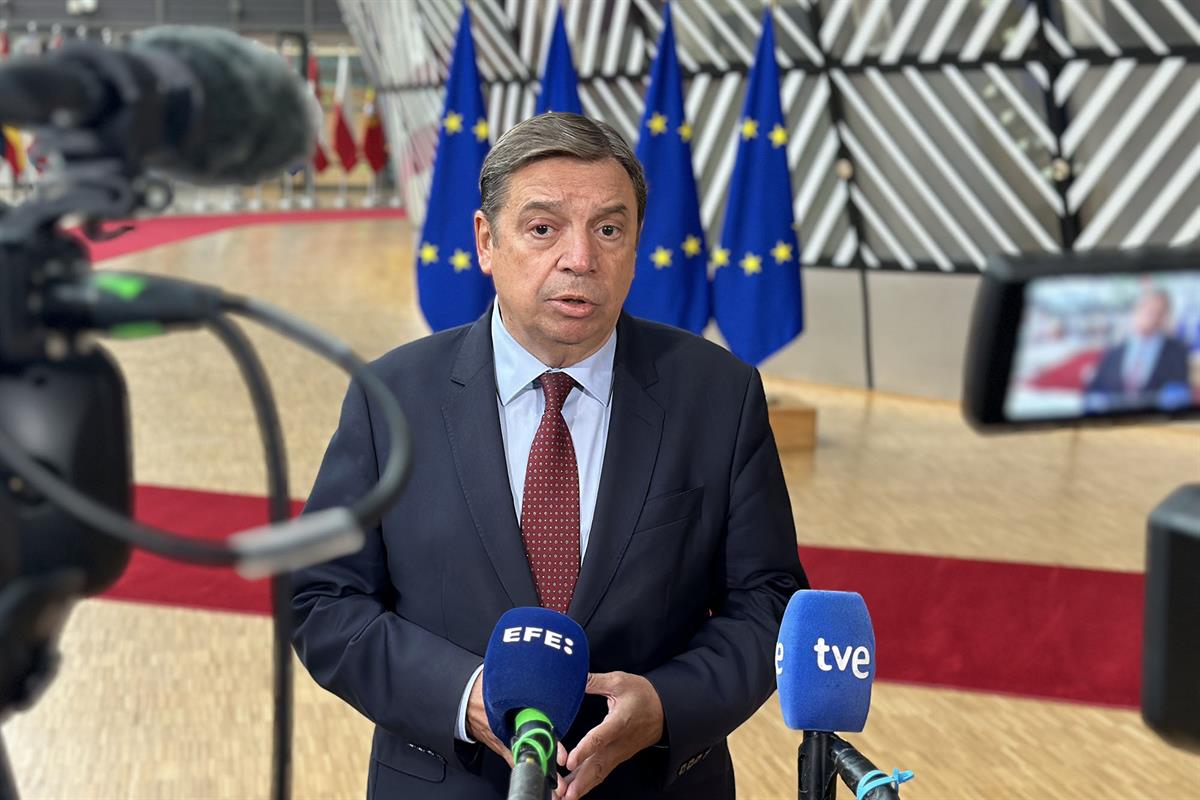Planas gives a positive assessment of the Common Agricultural Policy, with historic aid figures for farmers and stockbreeders
News - 2024.9.23
 The Minister for Agriculture, Fisheries and Food, Luis Planas, during his appearance before the media
The Minister for Agriculture, Fisheries and Food, Luis Planas, during his appearance before the media
Luis Planas has described the balance of the Spain's application of the current Common Agricultural Policy (CAP) as "positive". Specifically, in the first year of application, Spain has managed to settle more than 95% of the amounts corresponding to the 2023 campaign (as of 31 July), which will be completed by 15 October, to "reach the highest figure in the history of Spain received by the primary sector since 1986".
Luis Planas today attended the Council of EU Agriculture and Fisheries Ministers in Brussels, where he reviewed the state of play of the strategic plans for the CAP in the different Member States, in their second year of application, and in which it has been highlighted that Spain is a benchmark. Minister Planas stressed that the new features introduced in the CAP are "working well", both in terms of the redistributive payment and in the application of the eco-schemes, which are being applied by three out of four farmers and stockbreeders, i.e. more than 90% of the declared area.
However, the Minister pointed out that there are "aspects that we must improve" and asked the European Commission to make the procedure for amending strategic plans "simple and flexible", and to simplify the methodology for evaluating them.
He reiterated that Spain was one of the first countries in the European Union to adopt the amendment of its strategic plan last July (by unanimity between the Government of Spain and the regional government), which was approved by the European Commission on 30 August. The Minister understands, however, that flexibility is needed to make it easier for all Member States to amend their plans.
Member States' performance reports, established in the framework of a target-based CAP, were also discussed at today's Council. In this respect, the Minister pointed out that the control mechanisms for these yields are "tremendously complex" and called for "no more bureaucratisation of this CAP", so that its application is streamlined and simple for farmers and stockbreeders.
During the meeting, Planas praised the appropriateness of the report commissioned by the President of the European Commission, Ursula von der Leyen, in relation to the strategic dialogue on the future of European agriculture and livestock farming. He pointed out that the study fits with the Spanish position of encouraging greater grouping of farmers and stockbreeders in cooperatives, with the main objective of improving their negotiating position in agri-food contracts and enabling them to receive at least the cost of production.
Planas added that this report agrees with Spain's reasoning, for example, in relation to the redistributive payment of CAP funds, since "it is the small and medium-sized farmers and stockbreeders who really need this aid".
In any case, he expressed concern that the element of competitiveness in the agricultural sector was not better reflected in this strategic dialogue. "Spain is committed to the future, to an agriculture with farmers, but a 21st century agriculture, that is to say, characterised by more technology, with the possibility of applying new genomic techniques, for which we hope that a regulatory framework will be adopted," he added.
With regard to trade agreements, the Minister argued before the Commission that a definitive agreement should be reached with China to avoid imposing tariffs on European agri-food products. "The agri-food sector should not be subject to trade conflicts, which are negative for everyone, for producers, but also for consumers."
Rejection of anchovy fishing cuts
On fisheries issues, Minister Planas has insisted that the Commission withdraw or amend its proposal on anchovy fishing cuts in the Gulf of Cadiz. "We are clearly and categorically opposed to the European Commission's proposal, as it subdivides the area and is detrimental to the interests of the Spanish fleet," he stressed. The Minister clarified that it is not only the situation of the biological stock of the species that needs to be considered, but also the economic and social impact.
He also rejected the refusal of quota exchanges between countries and asked the Commission not to adopt measures that would result in the mooring of a fleet of 75 purse-seine vessels in the Gulf of Cadiz.
The EU Council of Ministers also examined the situation of the fisheries agreement with the United Kingdom, which expires in June 2026, with a view to initiating the process for its renewal. Minister Planas reiterated that, on 9 September, he met with the Secretary of State for Environment, Food and Rural Affairs Steve Reed in London to whom he conveyed the need for negotiations with the European Union to be concluded before next December, in order to facilitate the distribution of the Total Allowable Catch (TAC) and quotas for the Community fleet.
In this context, he indicated that Spain's priorities are focused on fishing for northern hake, megrim, monkfish and the Porcupine Bank nephrops, as well as cod catches in the Gran Sol area, red seabream and alfonsinos.
Fisheries disputes with Norway, in particular over the Nordic country's unilateral imposition of TACs and fishing quotas, were also discussed. The Minister considers Norway to be "a friendly country", but that this position "is not the right one" and called on the Commission to act "firmly to defend the interests of the EU".
Non official translation




